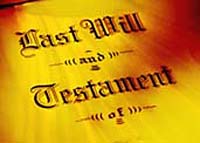
How to Avoid Probate in NY: Understanding Its Importance
“Probate is a process to transfer the assets after someone dies. For example, when a homeowner passes, probate allows for the home to be sold or transferred, if necessary, even though the owner is no longer alive to sign a deed.”
Estate planning attorneys are often asked if one of the goals of an estate plan is to avoid probate, regardless of the cost. The answer to that question is no, but a better question is the more even-tempered “Should I try to avoid probate?” In that case, the answer is “It depends.” A closer look at this question is provided in the recent article from The Daily Sentinel, “Estate Planning: Is Probate Something to Avoid at All Costs?”
Probate is not always a nightmare, depending upon where a decedent lived. Probate is a court process conducted by judges who usually understand the difficulty executors and families are facing, and their support staff who genuinely care about the families involved. This is not true everywhere, but your estate planning attorney will know what your local probate court is like. With that in mind, there are certain pitfalls to probate and there are situations where avoiding probate does make sense for your family. The probate court proceedings can be complex and time-consuming, making it essential to understand the legal process involved.
Transferring a deceased person’s assets can be challenging and costly, emphasizing the importance of proper planning to minimize these difficulties.
In the case where it makes sense to avoid probate, the planning strategy being used to avoid probate must be carefully evaluated. Does it make sense, or does it create further issues? Here’s an example of how this can backfire. A person provided their estate planning attorney with a copy of a beneficiary deed, which is a deed that transfers property to a designated person (called a “grantee”) immediately upon the death of the person who signed the deed (called a “grantor”).
The deed had been signed and recorded properly with the recorder’s office, just as a typical deed would be during the sale of a home. Note that a beneficiary deed does not transfer the title of ownership until the grantor dies. Probate can significantly diminish an estate’s assets due to court fees and lawyer charges, impacting the overall value received by heirs.
Here’s where things went bad. No one knew about the beneficiary deed except for the grantor and the grantee. The remainder of the estate plan did not mention anything about the beneficiary deed. When the grantor died, ownership of the property was transferred to the grantee. However, the will contained conflicting instructions about the property and who was to inherit it. Joint ownership can be a method to avoid probate, as property held jointly with the right of survivorship automatically transfers to the surviving owner.
Living trusts are another effective tool to avoid probate, allowing a designated successor trustee to manage the assets without court involvement.
Instead of avoiding probate, the grantor’s estate was tied up in court for more than a year. The family was torn apart, and the costs to resolve the matter were substantial. Payable on death designations and bank accounts are examples of strategies to avoid probate, ensuring a smooth transfer of assets to beneficiaries.
Personal property also plays a significant role in probate, as it needs to be inventoried and appraised during the proceedings.
Had the deceased simply relied upon the probate process or coordinated the transfer of ownership with his estate planning attorney, the intended person would have received the property and the family would have been spared the cost and stress. Sticking with the use of a last will and testament and the probate process would have protected everyone involved. Engaging a probate attorney is crucial to navigate the complexities of probate laws and procedures.
Estate taxes can also impact estate planning, with federal and state regulations affecting the financial implications for heirs.
Surviving owner designations in joint ownership can simplify asset transfer, ensuring seamless ownership without legal complications.
Transfer on death deeds, although useful in some states, are not permitted in New York, highlighting the need for alternative strategies.
Probate in New York presents specific challenges, including potential delays and additional costs for families managing an estate.
The surrogate’s court plays a vital role in the probate process, handling the administration of estates and resolving disputes.
The entire probate process can take an emotional and financial toll on families, making it essential to plan effectively.
New York probate court proceedings can lead to significant delays and costs, emphasizing the importance of strategic estate planning.
An experienced estate planning attorney can help determine the best approach for the family, with or without probate.
Reference: The Daily Sentinel (Oct. 3, 2020) “Estate Planning: Is Probate Something to Avoid at All Costs?“











